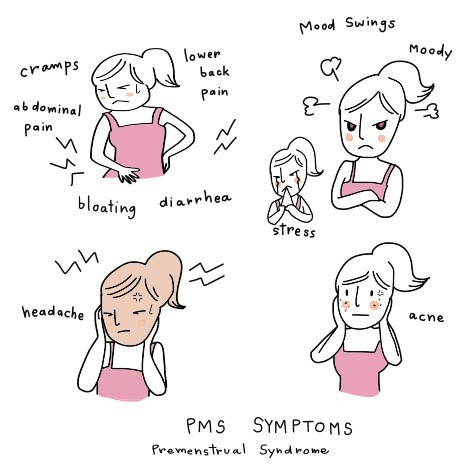About Premenstrual Syndrome (PMS)

Premenstrual syndrome, also known as PMS, occurs in women 1 or 2 weeks before the monthly period. It’s not just one symptom; the affected woman would experience a group of symptoms.
Usually, it affects all menstruating women; however, women between 30 to 50 would experience severe symptoms. PMS symptoms stop once you start to bleed. PMS would not affect women who are pregnant and those who have reached menopause.
Ideally speaking, it would affect any woman after puberty and before menopause. When the PMS symptoms worsen, it leads to Premenstrual Dysphoric Disorder (PDD), another serious medical condition that needs to be treated with medicines and therapies.
Let’s Know The Cause
The actual cause of PMS is not very clear; however, it is believed that the hormonal changes during the menstrual cycle trigger this medical condition. Stress and depression are not considered the cause of PMS; however, these would aggravate the medical condition. Vitamin and mineral deficiency, eating salty food and consuming alcoholic drinks and caffeine-containing drinks are considered possible causes of PMS.
Symptoms of PMS
The PMS symptoms are not same for all; it varies from woman to woman. Some would experience both physical and emotional symptoms. Though it’s quite annoying, it would not disturb daily life. But, when the symptoms worsen and affect the normal life, they should be treated. The common symptoms of PMS:
- The breast would swell and become tender
- Unable to sleep due to pain
- Increase in body weight
- Unable to focus
- Binge eating and food cravings
- Body pain
- Feeling sad and tearfulness
- Irritation and mood swings
- Anxiety, aggression, and anger
- Bloating
- Severe headache
- Constipation or loss tools
- Joint pain
- Mood swings
PMS Diagnosis
Once your doctor diagnoses PMS after reading your symptoms, start to keep track of your symptoms, this is essential to offer the proper treatment. Get the PMS symptom tracker from your doctor and begin recording the symptoms.
Treatment For PMS
Mainly, lifestyle changes can alleviate the PMS symptoms. The following lifestyle changes are necessary to treat PMS.
Include Whole Grains in Your Diet
Eat foods rich in fiber, including whole-grain bread and whole wheat pasta, instead of white bread and sugary cereals.
Reduce Sugar and Fatty Food Intake
At this time, your body would crave sugary items; however, limit intake of sugary things.
Avoid Salty Food Items
Reduce your sodium intake, especially for a week before periods. It’s advised to avoid hot dogs, canned foods, and chips high in sodium because they may worsen PMS symptoms.
Keep Hydrated
It would be best if you drank a lot of water to keep you hydrated.
Avoid Caffeinated Drinks
It’s better to avoid drinks that contain caffeine because it would increase tension and irritation.
Take Calcium
You should eat foods rich in calcium, including milk, soy milk, and dark leafy vegetables, or take calcium supplements. Studies reveal that taking 1300mg of calcium daily would help to reduce PMS symptoms.
Do Exercise
Do exercises like running, walking and dancing.
Stay Away From Alcohol
Drinking alcohol may aggravate your PMS symptoms and make you feel depressed.
Medication For PMS
- Antidepressants, known as selective serotonin reuptake inhibitors (SSRIs), are prescribed for women with severe PMS or PMDD.
- Pain killers are prescribed to alleviate some painful symptoms like stomach cramps, muscle pain, and headache.
- Oral contraceptive pills prevent ovulation (egg release from the ovary) and reduce PMS symptoms.
- Cognitive-behavioral therapy will also help to treat PMS. A cognitive-behavioral therapist can help you to handle these symptoms.
If you have PMS, maintain a diary to keep track of symptoms that you will experience 7 to 10 days before periods. Consult your doctor and discuss the symptoms. Stay alert; ignoring the symptoms may lead to severe consequences.
Trending Health Topics
- ADHD
- Allergies
- Arthritis
- Bipolar Disorder
- Bunions
- Car Accidents
- Chron's Disease
- Common Cold
- COPD
- Depression
- Dry Skin
- Dry throat
- Eczema
- Fungal Infection
- GERD
- HIV/AIDS
- Hypertension
- Irritable Bowel Syndrome (IBS)
- Multiple Sclerosis
- Osteoarthritis
- Psoriasis
- Rheumatoid Arthritis
- Skin Disorders
- strep throat
- Type 2 Diabetes
- Uncategorized